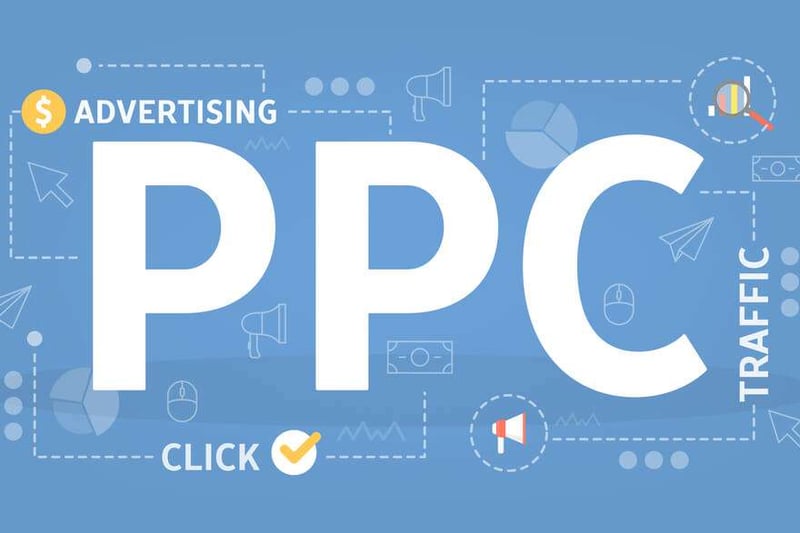Pay-per-Click (PPC)-Anzeigen können ein unglaublich leistungsfähiges Instrument zur Lead-Generierung sein, und so ist es kein Wunder, dass ein durchschnittliches KMU bis zu 120.000 US-Dollar pro Jahr für diese Taktik ausgibt. Diese Investition sollte sich lohnen!


Was aber, wenn Ihre PPC-Kampagnen ins Leere laufen? Es gibt fünf Hauptgründe, warum Ihre PPC-Anzeigen scheitern könnten - und einige einfache Schritte, die Sie unternehmen können, um sie zu beheben.
Aufhören, bevor Sie vorne sind
Ihre PPC-Kampagne ist keine "einmalige" Werbung, sondern erfordert, dass Sie sich kontinuierlich um Ihr Marketing kümmern. Wenn Sie Ihre Werbung nicht konsequent und leicht anpassbar gestalten, werden die Kunden schnell das Interesse verlieren und Ihre Konversionsrate wird sinken.
Um dem entgegenzuwirken, sollten Sie auf Ihrer Seite Aufrufe zum Handeln einbauen, um das Interesse der Kunden aufrechtzuerhalten. Newsletter, Mailinglisten, kostenlos herunterladbare Inhalte und die Möglichkeit, einen Termin oder eine Beratung zu vereinbaren, sind gute Möglichkeiten, um das Interesse Ihrer Kunden auch nach dem ersten Klick zu erhalten.
Sobald Sie Ihre potenziellen Leads zum Verbleib auf Ihrer Seite bewegt haben, ist es an der Zeit, sie in erste, hoffnungsvolle und treue Kunden zu verwandeln. Der beste Weg zur Optimierung der Konversionsrate in Ihrer Werbekampagne besteht darin, die Customer Journey und die Buyer Persona Ihrer am stärksten involvierten Bevölkerungsgruppe zu verstehen. Zu verstehen, was Menschen dazu bringt, Ihr Produkt zu kaufen, und welche Art von Menschen es kaufen, ist die wertvollste Information, die Sie haben können.
Ihre Schlüsselwörter verraten Sie
Alle Probleme mit Ihren Kampagnen lassen sich darauf zurückführen, dass Sie Ihre Buyer Persona nicht gut verstehen. Wenn Sie die Zielgruppe kennen, die Sie ansprechen möchten, können Sie Schlüsselwörter wählen, die dazu führen, dass Ihre Anzeige angezeigt wird. Wenn Ihre Anzeigen spezifischen Gruppen angezeigt werden, ist es wahrscheinlicher, dass Sie Klicks und Konversionen erhalten als bei unspezifischen allgemeinen Begriffen.
Ihre Kampagne sollte auch negative Schlüsselwörter enthalten. Negative Schlüsselwörter sorgen dafür, dass Ihre Anzeige bei einer bestimmten Suchphrase nicht angezeigt wird. Die Aufnahme negativer Schlüsselwörter hilft Ihnen, Ihre Anzeigenpräsentationen auf relevante Suchanfragen zu fokussieren. Dies wiederum führt zu mehr Konversionen und weniger vergeblichen Klicks.
Bouncing der Grundlagen
Das Verständnis Ihrer Kunden ist der Schlüssel zu einer erfolgreichen Marketingkampagne, aber es gehört mehr dazu als nur spezialisierte Inhalte. Wenn Sie sicherstellen, dass die richtige Persona für Ihr Unternehmen gefunden wird, werden automatisch die richtigen Suchbegriffe kuratiert, aber das reicht nicht immer aus, um Ihre Kunden zunächst auf Ihre Website zu locken. Es besteht die Möglichkeit, dass Ihre Kunden nicht auf dem neuesten Stand sind, was alle aktuellen Marketing-Schlagworte angeht, und dass sie Ihre komplexe Kampagnenstruktur nicht so sehr zu schätzen wissen.
Eine einfache, gut organisierte Kampagne wirkt viel weniger chaotisch und ist leichter zu verfolgen. Minimalismus wird von fast allen Altersgruppen bevorzugt und trägt dazu bei, dass Ihre Werbeinformationen relevant und attraktiv bleiben.
Zu einer effektiven Kampagne gehört es, mit einem Ziel zu beginnen, Schlüsselwörter zu haben, die ein bestimmtes Thema widerspiegeln, und eine attraktive und für das Ziel der Kampagne relevante Anzeige zu erstellen.
Ihre Landing Page ist ein großes Versäumnis
Ihre Website ist das Herzstück Ihrer Online-Präsenz und der Ort, an dem Sie Ihre Botschaft am besten rüberbringen können. Vernachlässigen Sie nicht die speziellen Landing Pages für das aktuelle Produkt oder die Dienstleistung, die Sie bewerben möchten. Landing Pages sind eine einfache Möglichkeit, dem Käufer so viele relevante Informationen wie möglich in einem benutzerfreundlichen Format zu vermitteln, ohne mit ihm zu sprechen.
Ein gutes Beispiel für die Verbesserung Ihrer Landing Page(s) ist die Verwendung von Farben, Layouts und Designs, die Ihre Zielgruppe am meisten ansprechen. Auf Ihrer Landing Page sollten Sie alles Wichtige zu dem, was Sie zu verkaufen versuchen, unterbringen. Fügen Sie leicht verständliche Infografiken, ausführliche Produktbeschreibungen, Kundenrezensionen und Call-to-Action-Medien ein, um die Verbraucher zu ermutigen, den Kaufprozess zu verfolgen.
Sie nutzen keine sozialen Medien
In der heutigen Welt hat jeder mindestens ein Social-Media-Konto. Mama, Papa, Oma und sogar der Hund des Nachbarn sind auf einer sozialen Plattform und konsumieren ständig unzählige Stunden an sinnlosen Informationen. Warum sollte man sich das also nicht zunutze machen?
Auf Instagram und Facebook, um nur einige zu nennen, werden Produktanzeigen in den "Feed" einer Person eingeblendet, was es leicht macht, die richtige Zielgruppe anzusprechen und eine Fülle von Klicks zu generieren. LinkedIn-Anzeigen könnten die besten Ergebnisse liefern, wenn Sie im B2B-Bereich tätig sind.
Sie können auch in diese Plattformen eingebettete Tools verwenden, um Ihr Publikum erneut anzusprechen, wenn es die Plattform verlässt. Das Retargeting auf sozialen Plattformen ist einfach und in wenigen Schritten erledigt. Auf diese Weise können Sie den potenziellen Interessenten bis zu ihrer nächsten Suchmaschine folgen, in der Hoffnung, ihre Aufmerksamkeit erneut zu gewinnen und sie in Kunden zu verwandeln.
Also... wie sieht der Plan hier aus?
Ihre Kampagne sollte organisiert und gut durchdacht sein, mit einem klaren Ziel, einem Motiv, einem Aktionsplan, einem Zeitplan und einer Kennzahl, anhand derer Sie Ihre Erfolgsquote ermitteln können. Die kleinen Details, die Ihre Kampagne ausmachen, werden sich von selbst ergeben, sobald Sie das Gesamtbild skizziert haben. Bevor Sie überhaupt mit der Kundenforschung beginnen können, müssen Sie wissen, was das Ziel Ihrer Kampagne ist, warum Sie sie durchführen und wie sie Ihrem Unternehmen helfen wird.
Die Kenntnis Ihrer Buyer Persona hilft Ihnen bei der Erstellung Ihres Aktionsplans. Sobald Sie Kundendaten gesammelt haben, können Sie Ihre Kampagne auf die Bedürfnisse der Kunden abstimmen. Indem Sie sich auf die Verbesserung der Konversionsrate und der Kapitalrendite konzentrieren, können Sie feststellen, ob Ihre Werbekampagne erfolgreich ist oder nicht. All dies wird jedoch exponentiell einfacher, wenn Sie ein Ziel haben. Ihr Ziel ermöglicht es Ihnen, Ihre Kampagne im Auge zu behalten und leicht Korrekturen vorzunehmen, wenn sie nicht so funktioniert, wie Sie es sich wünschen. Anstatt monatelang Geld zu verschwenden, können Sie Ihre Schlüsselwörter, die Anzeigenästhetik, die Landing Page und alle anderen Aspekte schnell optimieren, um Ihre Konversionsrate zu verbessern.
Bei PPC-Werbung gibt es einen schmalen Grat zwischen einem guten Ergebnis und einem Misserfolg. Diese Form der Werbung kann eine große Hilfe sein, um Ihre Markenidentität zu verbreiten, neue Kunden in Ihren Trichter zu bekommen, Ihre Konversionsrate zu verbessern und Ihr Unternehmen zu vergrößern. Wenn Sie verstehen, was bei PPC-Werbung funktioniert und was nicht, können Sie sicherstellen, dass Ihre Kampagne ihr volles Potenzial erreicht.
Brauchen Sie jemanden, der Ihnen hilft, Ihre PPC-Kampagne auf Vordermann zu bringen?









.webp?width=352&name=Could-PPC-Be-the-Secret-to-Success-for-Immediate-Results%20(1).webp)

Kommentar hinterlassen